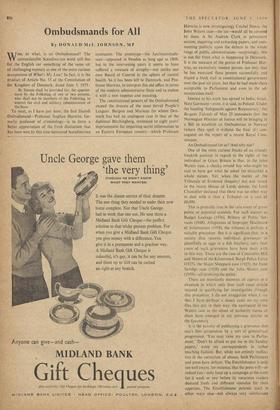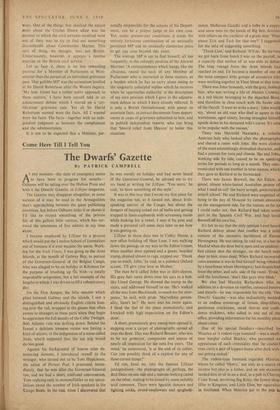Ombudsmands for All By DONALD Mcl. JOHNSON, MP W HO, or
what, is an Ombudsmand? The untranslatable Scandinavian word still has for the English ear something of the same air of challenging mystery as one of the more curious occupations of What's My Line? In fact, it is the product of Article No. 55 of the Constitution of the Kingdom of Denmark, dated June 5, 1953: By Statute shall be provided for, the appoint- ment by the Folketing of one or two persons, who shall not be members of the Folketing, to control the civil and military administration of the State.
To meet, as I have just done, the firsl Danish Ombudsmand—Professor Stephan Hurwitz, for- merly professor of criminology—is to form a better appreciation of the fresh distinction that has been won by this time-honoured Scandinavian institution. The prototype—the Justitieombuds- man—appeared in Sweden as long ago as 1809, but in the intervening years it seems to have suffered a measure of atrophy—not unlike our own Board of Control in the sphere of mental health. So it has been left to Denmark, and Pro- fessor Hurwitz, to interpret this old office in terms of the modern administrative State and to endow it with a new impetus and meaning.
The constitutional powers of the Ombudsmand exceed the dreams of the most fervid People's Leaguer. Burgess and Maclean (to whom Den- mark has had an analogous case in that of the diplomat Blechingberg, sentenced to eight years' imprisonment for imparting secret information to an Eastern European country—which Professor Hurwitz is now investigating), Crichel Down. the John Waters case—the lot—would all be covered by them. A Sir Andrew Clark in permanent session, inquiring and extracting papers, and com- menting publicly upon the defects in the whole range of public administration—surprisingly, this is not far from what is happening in Denmark. It is the measure of the genius of Professor Hur- witz, an excessively modest person, not only that he has exercised these powers successfully and blazed a fresh trail in constitutional government over the past six years, but that he had made them acceptable to Parliament and even to the ad- ministration itself.
Interest in his work has spread to India. Israel. West Germany—even, it is said, to Poland. Under the heading 'Safeguards against Bureaucracy. the Bergens Tidende of May 25 announces that the Norwegian Minister of Justice will be bringing in a Bill to establish an Ombudsman in Nora (where they spell it without the final con- sequent on the report of a recent Royal Com- mission.
An Ombudsmand for us'? And why not'?
One of the most curious freaks of an already freakish position in regard to the rights of the individual in Great Britain is that, in the John Waters case, a cheeky errand boy who might be said to have got what he asked for disturbed a whole nation. Yet, when the matter of the Tribunals Of Evidence (Inquiry) Act was raised in the recent House of Lords debate, the Lord Chancellor declared that there was no other way to deal with it than a Tribunal—at a cost of £8,000.
This is probably true in the rare event of grave public or potential scandals. For such matters as Budget Leakage (1036), Bribery of Public Ser- vants (1948). Allegations of Improper Disclosure of Information (1958), the tribunal is perhaps a suitable procedure. But it is significant that. in a society that spawns individual grievances .ts pfentifully as eggs in a fish hatchery, only four cases of such grievances have been dealt v4 ith in this way. These are the case of Constables Hill and Moore of the Kilmarnock Burgh Police Force (1925), the Major Sheppard case (1925), the Irene Savidge case (1928) and the John Waters ea,, (1959)—all involving the police.
There are manifestly elements of caprice in a situation in which only four such cases should succeed in qualifying for investigation through this procedure. 1 do not exaggerate when I say that I have perhaps a dozen cases on my own files that are, in their way, the equivalent of the Waters case in the abuse of authority (some of them have emerged in mY previous articles in the Spectator).
It is the penalty of publicising a grievance that one's files accumulate by a sort of geometrical progression. 'You may raise my case in Parlia- ment,' Don't be afraid to put me in the Sunday papers,' write my correspondents in rather touching fashion. But, while not entirely ineffec- tive in the correction of abuses, both Parliament and press have defects. The Establishment is only too well aware, for instance, that the press will—or indeed tan—only keep up a campaign at the most for a week or two before its voracious readers demand fresh and different stimulus for their appetites. The Establishment defends itself E .C.2 other ways also—not always very satisfactory
ways. One of the things that shocked the nation most about the Crichel Down affair was the manner in which the civil servants involved went out of their way to try to find out something discreditable about Commander Marten. This sort of thing, we thought, was not British. Unfortunately, however, it appears a routine exercise in the British civil service.
Let us face it, there is no less rewarding pastime for a Member of Parliament at West- minster than the pursuit of an individual grievance case. 'Our gullible MP' was the accusation levelled at Sir David Robertson after the Waters inquiry. 'My hon. friend has a rather naïve approach to these matters,' I have been myself told in an adjournment debate which I moved on a 'cer- tification' grievance case. Yet all Sir David Robertson wanted were the facts. All I wanted were the facts. The facts—together with an inde- pendent judgment as between the complainant and the administration.
It is not to be expected that a Minister, per- sonaily responsible for the actions of his Depart- ment, can be a proper judge in his own case. Yet, under present-day conditions; it needs the entirely fortuitous combination of an unusually persistent MP and an unusually clamorous press to get any case beyond this point.
The average MP is apt to find himself, all too frequently, in the unhappy. position of the Ancient Mariner. 'A correspondence which hangs, like the albatross, round the neck of any Member of Parliament who is interested in these matters, as a burden which he has to carry alone owing to the singularly unhelpful replies which he receives when he approaches authority' is the description of my own position which I gave in the adjourn- ment debate to which I have already referred. It is only a British Ombudsmand, with power to ascertain facts, to extract documents from depart- ments in cases of grievance submitted to him, and to publish independent reports, who can bring that `bless'd relief from Heaven to better this situation.







































 Previous page
Previous page